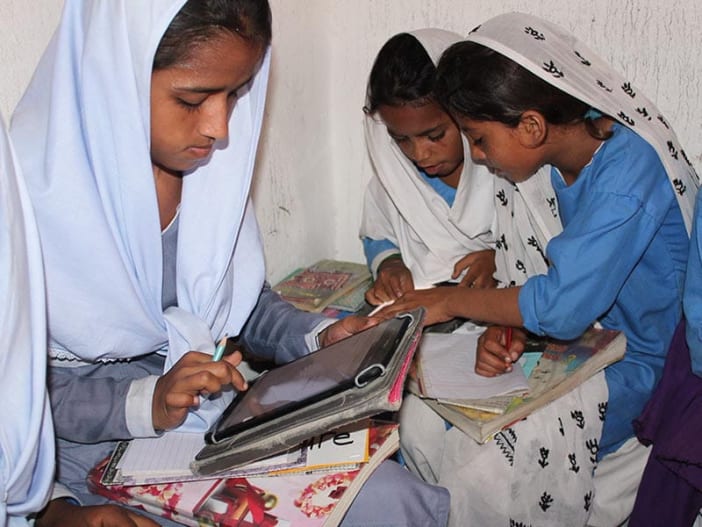The Government of Kenya has made education a priority, seeing it as a way to encourage social and cultural transformation on issues such as poverty, disease, child-marriage, corruption and adult illiteracy.
In January 2003 the Government announced the introduction of Free Primary Education. This led to nearly one million new pupils enrolling in primary school. In individual schools the number of pupils increased by up to 25%, which placed great demands upon the Ministry of Education. Overcrowded classes and under-trained teachers meant that many students soon dropped out. A major challenge was to rapidly increase the numbers of trained teachers.
A school empowerment programme was developed to train 200,000 primary school teachers. This is a distance learning programme which trains teachers as they work. It makes use of information technology such as video cassettes, audio cassettes and radio broadcasts, as well as printed materials. A study was carried out in 2004, to look at attitudes to information and communication technology among teachers in eight areas of Kenya. This showed the potential of using mobile phones and SMS (text messaging) as part of the learning process. SMS is a system for sending messages as short typed texts on a mobile phone.
The benefits of using SMS in Kenya are clear
Conventional methods of sharing information are limited due to:
- Poor roads and postal services
- Remote rural areas
- Poor landline telephone networks
- Poor access to electricity from the national grid
- Little or no internet access outside one or two major cities
- Few modern computers, and little or no user expertise, especially in smaller towns and rural areas.
SMS has great advantages:
- Good mobile phone networks
- The potential for using solar power to charge mobile phones
- High levels of mobile phone ownership and usage.
Teachers showed interest and acceptance of using SMS for learning. The use of SMS to share information is well established. However, its use in supporting teaching and learning based around discussion is more exciting and challenging. In this teacher training programme, SMS is used for delivering:
- Study guide material and week-by-week support, highlighting the important issues to focus on
- Content such as hints, tips, outlines, lists, summaries, revision
- Reminders about future assessments, assignments or meetings
- Discussion in the form of feedback, questions and answers
- Support and encouragement
- Urgent messages about errors, cancellations and changes.
The system is free to authorised teachers who use an individual identity code. At a local level, study groups of registered participants can use the system to chat about their work and encourage each other.
At the end of trials, the technical and organisational achievements of the system were impressive. 8,000 teachers took part in the trials. About 85% of them were active users and over a quarter of a million SMS messages have been sent to date.
John Traxler is Reader in Mobile Technology for e-Learning in the School of Computing and IT at the University of Wolverhampton. He researches ways of using innovative technologies to support sustainable learning in Africa.
He is co-editor (Kukulska-Hulme A and Traxler J, Eds 2005 Mobile Learning: A Handbook for Educators and Trainers, Routledge, London) and co-author of Commonwealth of Learning guidance on Mobile Learning in Developing Countries. Email: [email protected]
Mobile phones and the Millennium Development Goals
Goal 8: Develop a global partnership for development (trade/aid/debt).
Target 18: In co-operation with the private sector, make available the benefits of new technologies, especially information and communications.
Indicator 47: Telephone landlines and mobile (cell) phone subscribers per 100 population.
- The countries with the fewest telephone landlines are the Democratic Republic of Congo (fewer than one per 1,000 people) and Chad (one per 1,000 people).
- The average for Sub-Saharan Africa is ten landlines per 1,000 people and 74 mobile phones per 1,000 people.
- In 44 out of the 48 Sub-Saharan African countries, there are more mobile phones per 1,000 people than landlines per 1,000 people.
Source: Statistics from World Bank, October 2006
Mobile phones to save lives
In Orissa, India, few people have home telephones. Landlines either never reached the rural areas of this region, or were destroyed by terrorist groups. However, it is common to see people using mobile phones. A local organisation called TREAD (Trinity Rural Educational Association for Development) have a vision for developing healthcare in the rural areas using this new technology.
In remote areas many people die unnecessarily because they have no access to medical care. TREAD’s vision is for each village in the area to have one local person trained in primary healthcare, and equipped with a mobile phone. They would be able to deal with many common health questions and also bring hygiene education to the village. When an emergency arose that was too complicated for their skills, they could contact the nearest health centre by phone and have an ambulance sent out immediately, to bring essential medicines or to take the sick person back to the health centre.
Many lives could be saved using this technology.







